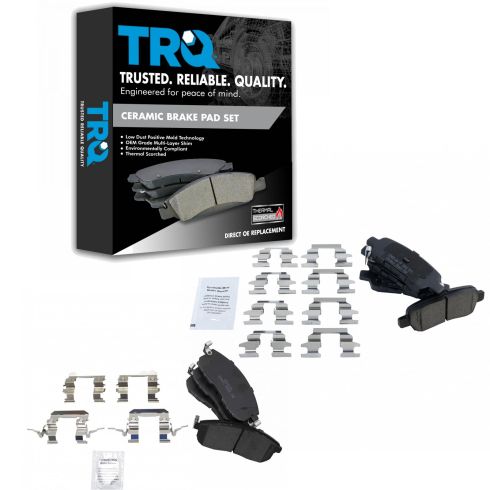How to Replace Front Brakes 2013-19 Nissan Sentra
Created on: 2020-03-16
Watch this video to learn how to install front brake rotors and pads on your 2013-19 Nissan Sentra.
Tools needed
-
14mm Wrench
Torque Wrench
Socket Extensions
14mm Socket
Jack Stands
19mm Socket
Brake Parts Cleaner
21mm Socket
Flat Blade Screwdriver
Socket Driver
Paper Towels
Copper Anti-Seize
Wheel Chocks
Brake Grease
Brake Caliper Compressor Tool. Quad Piston. Ratchet Style.
Ratchet
Floor Jack
Wire Brush
1/2 Inch Impact Gun
...take the wheel off, we're gonna use a 21-millimeter socket. Remove the wheel.
...these two caliper bolts out, I'm gonna use a 14-millimeter socket. Loosen this one up. Loosen this one up. And take those out. Take that one out, take this one out. Now just take a screwdriver, straight blade screwdriver. Just pry the caliper out a little bit. That's just gonna compress the piston. And then slide the caliper off. You can use a hanger, and just hang it from the coil spring. Make sure there's no tension on the brake hose.
Take the brake pads off. Can use a straight blade screwdriver. Slide them out. Gonna use a 19-millimeter socket. Take these two caliper bracket bolts out. Take those bolts out. Slide the bracket right off.
All right, grab the rotor. Slide it off. If it didn't come off that easy, you can just use a hammer and hit right in those areas, and it should pop right off.
And now just take a wire brush. Just clean up the surface where the rotor's gonna sit on the hub. There's a little bit of rust here. It's a good idea to take a little copper anti-seize and just put it on the hub, just so the rotor doesn't stick to it. All right, take the rotor, put it on backwards, take a little brake parts cleaner, spray it down. Wipe it down. Flip it over. Do the same on this side.
Now we're gonna clean up the brake caliper bracket. I'm gonna take a straight blade screwdriver, just slide these pad clips off, or anti-rattle clips. Take a wire brush, just clean some of the rust off of here. And it looks good. Take a little brake caliper grease. Take one of the new clips, slide it in position, and lock it in place. And we're gonna do the same on this side, but the only thing is, these clips are a little bit different. These have these extra ears, so keep that in mind. Now, just take a little brake caliper grease and just do a nice thin coat. And, same on this side.
Now, pull the brake caliper slides out. Take a little brake parts cleaner, clean off the slide pin. Wipe it off. Can spray a little brake parts cleaner in here, and clean that out as well. Take some fresh brake caliper grease, grease up the pin. Slide it back in the caliper bracket. Make sure that's sealed properly. Do the same on the other side.
And take the brake caliper bracket, slide it in position. Put the bolts back in. And torque these bolts to 122 foot-pounds.
Now we're gonna take the new brake pads. On the outside, you're gonna have the brake pad low warning indicator on the top, and that's gonna slide in this little tab right here, just like that. Slide that on. And on the inside one, it's still gonna be on the top. And just slide it in that tab right there. It's a little bit tricky. There we go.
Now we're gonna compress this brake caliper piston. I'm gonna use a brake caliper compressing tool. Just slide it in here. If I can get the tool to work. There we go. And just compress it slowly. As you compress it, it's gonna push the fluid through the lines, back up into the master cylinder. All right, the piston's all compressed. Take the hanger off the caliper. Slide it over the brake pads. Just like that. Take the bolts, get the bolts started. Now I'm gonna torque these bolts to 20 foot-pounds.
Put the wheel back on. And the lug nuts. Now I'm gonna torque these lug nuts to 83 foot-pounds, in a star pattern, to tighten the wheel down evenly. Just go around again, double check.
And pump the brake pedal. Nice and slow. There's gonna be an air gap between the brake caliper piston and the brake pads.
And then check the brake fluid level, and adjust accordingly.
Shop Products

Nissan Infiniti Front & Rear Ceramic Brake Pads TRQ BFA13019
Part Details:
- Ceramic
- Premium Posi
- Ceramic
- (1) Front Ceramic Brake Pad Set
- (1) Rear Ceramic Brake Pad Set
- Yes

How to Replace Rear Brakes 2007-11 Honda CR-V
How to repair, install, fix, change or replace your own worn, squeaky, fading old brakes on 09 Honda CRV






